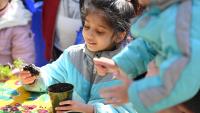Dani Dumitriu, MD, PhD
On the web

Overview
Dani Dumitriu, MD, PhD, is an Associate Professor of Pediatrics (in Psychiatry) and Director of the Center for Early Relational Health. She dedicates 80% of her time to research and 20% to active pediatric practice in the Newborn Medicine Unit at Morgan Stanley Children’s Hospital of New York.
Dr. Dumitriu is internationally recognized for her expertise in pediatrics, neuroscience, resilience, family, and clinician-inclusive study design, and dyadic measures of parent-child health, such as maternal-infant connection, prenatal and early postnatal influences (including stress) on maternal-infant health, and the relationship between early relational health and life course health outcomes.
The uniting principle of Dr. Dumitriu’s multifaceted research program is to actuate a strengths-based pivot in pediatrics: preventing pathology by promoting resiliency. From basic science through clinical & implementation studies, her multi-modal, multi-species, multi-scale research focuses on understanding and harnessing the neurocircuits of resilience, toward spearheading novel approaches to universal primary prevention.
One of the top-funded researchers in the Department of Pediatrics, Dr. Dumitriu, also actively leads field-building work. She co-founded the Maternal Child Research Operations (MaCRO) Consortium at Columbia (a coordinating hub for research that spans obstetrics, pediatrics, and psychiatry) and is revolutionizing family- and pediatrician-inclusive research through a unique partnership between CERH, Reach Out and Read, and Nurture Connection (at Georgetown University’s Thrive Center for Children, Families, and Communities). Together, they co-lead the movement to meaningfully advance the field of ERH. Dr. Dumitriu further serves on the steering committee for Nurture Connection and on the Foundation for Social Connection’s Scientific Advisory Council.
Areas of Expertise / Conditions Treated
- Newborn Care
- Newborn Medicine
- Newborns
Academic Appointments
- Associate Professor of Pediatrics (in Psychiatry)
Administrative Titles
- Inaugural Director, Center for Early Relational Health
- Chair, the COMBO Initiative
- Co-Chair, the WiSE Club, Psychiatry
- Training Faculty, Columbia Doctoral Program in Neurobiology & Behavior
Hospital Affiliations
- NewYork-Presbyterian / Columbia University Irving Medical Center
- NewYork-Presbyterian Morgan Stanley Children's Hospital
Languages
- Romanian
- Swedish
Gender
- Female
Schedule an Appointment
Connect Patient Portal
For existing patients, login to make an appointment, view documentation or contact your care provider.
Credentials & Experience
Education & Training
- MD, Icahn School of Medicine at Mount Sinai
- BS, Cognitive Neuroscience, University of California, Santa Barbara
- MBBS, Bachelor of Medicine, Bachelor of Surgery, Hawaii Pacific University
- PhD, Pediatrics, Icahn School of Medicine at Mount Sinai
- Residency: Mount Sinai Hospital
- Fellowship: Mount Sinai Hospital
Committees, Societies, Councils
- 2019: Member, Society for Pediatric Research
- 2018: Fellow, Society for Biological Psychiatry
- 2013: Member, American Academy of Pediatrics
- 2001: Member, Society for Neuroscience
Board Certifications
- Pediatrics
Honors & Awards
- 2020: Society for Pediatric Research New Member Outstanding Science Award
- 2019: Society for Biological Psychiatry Domestic Travel Fellowship Award
- 2019: Research Initiatives in Science & Engineering Award
- 2017: Kurt Hirschhorn MD Clinician-Scientist Award, Kravis Children’s Hospital, NY
- 2016: Reach for Your First R01 Scholar, Icahn School of Medicine at Mount Sinai, NY
- 2016: AAP SOPT Partner for Resilience
- 2015: NARSAD Young Investigator Award
- 2012: NINDS/AUPN/ANA Combining Research and Clinical Careers in Neuroscience, DC
Research
Preventing Pathology by Promoting Resiliency
During the last century, medicine has made unprecedented progress in the treatment of disease, with significantly less effort devoted to the prevention of disease. Stressful life events, particularly during critical developmental periods, have been linked to increased risk of virtually all diseases. Notably, even in the presence of the most severe stressors, some individuals remain resistant to the development of stress-induced pathology. Identifying the neurobiological basis for this natural resiliency holds enormous potential for developing universal preventive strategies to strengthen resiliency circuits. Dr. Dumitriu’s long-term vision is developing actionable clinical change to nudge developmental trajectories toward resilience at the population level.
To investigate how stress and resilience become developmentally embedded and drive individual and relational outcomes, Dr. Dumitriu leads the Developmental Origins of Resilience (DOOR) Lab. Using state-of-the-art in vivo and ex vivo tools in animal models, the lab probes neural mechanisms of: individual variability in stress-responses to social and non-social stressors, developmental trajectories following early-life stressors, and autonomic synchrony as a potential protective factor. She conducts parallel analyses during human mother-infant interactions. Committed to collaboratively developing new tools and furthering the #openscience movement, the DOOR lab developed MouseCircuits.org, an open science repository of chemogenetic and optogenetic circuit dissection for the neuroscience community.
Dr. Dumitriu also chairs the COMBO Initiative: a world-leading clinical study of maternal-infant/child health that has generated an unprecedented foundational dataset on mothers and babies since early 2020. Thanks to its groundbreaking advancements in multidisciplinary, dyadic, and pediatric research, COMBO evolved into the Center for Early Relational Health (CERH), with Dr. Dumitriu as its inaugural director.
As the academic hub of excellence for the science of early childhood relationships, CERH dedicates a major portion of its focus to uncovering the mechanisms of: how strong, supportive early relationships form; under what conditions they develop; and what they predict about childhood health. Building this foundational understanding of ERH is an essential step toward innovating and scaling much-needed dyadic interventions that promote strong relationships as early as possible and embedding evidence-based primary prevention into universal pediatric care.
To that end, CERH leads the clinical research for COMBO National: a nationwide expansion of the original COMBO study, in exclusive partnership with Reach Out and Read (the nonprofit organization leading its implementation research). This cornerstone ERH study is the first to look at all known constructs (and some as-of-yet unidentified constructs) of parent/caregiver-child relationships and how they map onto lifecourse outcomes. COMBO National is co-designed in partnership with the parents and pediatric care practitioners it serves.
Research Interests
- Brain Imaging
- Early-Life Stress
- Early infant and child development
- Models of Psychiatric Disorders
- Synapses and Circuits
Clinical Trials
- Study: Mother-infant Bonding During COVID-19
ClinicalTrials.gov ID: NCT04531618
Sponsor: Columbia University
PI: Dani Dumitriu, MD, PhD
For more trials and studies, please visit RecruitMe
Grants
Active
- NIMH R01MH126531 (Dumitriu, Monk, Marsh, MPI)
04/12/2021-01/31/2026
Title: COVID-19 Mother Baby Outcomes (COMBO): brain-behavior functioning
Description: COMBO seeks to understand the effects of COVID-19 on newborns born during the pandemic and their mothers. This proposal will investigate the socioemotional health of the mother-infant dyad. - CDC and Abt 75D30120C08150(Stockwell, PI; Dumitriu, PI sub-study)
01/01/2021-04/30/2022
Title: ESPI COMBO study
Description: This project will follow up participants enrolled in CDC’s national surveillance project, ESPI, through 6 months of age to understand long-term outcomes of mother-baby health and wellbeing during the pandemic. - NIMH R01MH111918 (Dumitriu, PI)
09/18/2017-06/30/2022
Title: Multiscale connectomic principles of resilience and susceptibility in mouse
Description: This project investigates individual variability in the structural and functional connectomes associated with divergent stress response in an adult social defeat model.
Recently Completed
- CPRC Seed Grant (Dumitriu & Monk, MPI)
07/01/2020-06/30/2021
Title: The impact of maternal race and psychosocial stress in the context of the COVID-19 pandemic on mother and newborn sleep health.
Description: This project focuses on the specific question of sleep and race within the larger COMBO (COVID-19 Mother Baby Outcomes) study. - Columbia University RISE Award (Dumitriu & Kymissis, MPI)
06/01/2019-05/30/2021
Title: Novel telemetry for studying wild rats in the wild
Description: In collaboration with Dr. John Kymissis from Electrical Engineering, we build implantable, peer-to-peer enabled, rechargeable telemetry devices for rats.
Selected Publications
- Tatyana B. Behring, Margaret H. Kyle, Maha Hussain, Jack Y. Zhang, Alessia Manganaro, Jasmine H. Kaidbey, Robert J. Ludwig, Michael M. Myers, Martha G. Welch, Dani Dumitriu. A severe form of maternal separation in rat consisting of nineteen-day 6-hour daily separation at unpredictable times minimally affects behavior across lifespan, bioRxiv: 2021.06.07.447289
- Dumitriu D, Emeruwa UN, Hanft E, Liao GV, Ludwig E, Walzer L, Arditi B, Saslaw M, Andrikopoulou M, Scripps T, Baptiste C, Khan A, Breslin N, Rubenstein D, Simpson LL, Kyle MH, Friedman AM, Hirsch DS, Miller RS, Fernández CR, Fuchs KM, Keown MK, Glassman ME, Stephens A, Gupta A, Sultan S, Sibblies C, Whittier S, Abreu W, Akita F, Penn A, D’Alton ME, Orange JS, Goffman D, Saiman L, Stockwell MS, Gyamfi-Bannerman C. Outcomes of neonates born to mothers with Severe Acute Respiratory Syndrome Coronavirus 2 infection at a large medical center in New York City. JAMA Pediatrics 2021; Feb 1; 175(2):157-167
- Grossman YS, Fillinger C, Manganaro A, Voren G, Waldman R, Zou T, Jansen W, Kenny P, Dumitriu D. Prelimbic-amygdala overexcitability mediates trait vulnerability in a mouse model of acute social stress. bioRxiv 2020: 06.11.147231
- Gozali A, Gibson S, Lipton LR, Pressman AW, Hammond BS, Dumitriu D. Assessing the effectiveness of a pediatrician-led newborn parenting class on maternal newborn-care knowledge, confidence and anxiety: A quasi-randomized controlled trial. Early Human Development 2020; Aug; 147:105082
- Anderson KR, Harris JA, Ng L, Prins P, Memar S, Ljungquist B, Furth D, Williams RW, Ascoli GA, *Dumitriu D. (2021) Highlights from the era of open source web-based tools. Journal of Neuroscience 2021; 41(5): 927-936
- Dumitriu D, Rodriguez A, Morrison JH. High-throughput, detailed, cell-specific neuroanatomy of dendritic spines using microinjection and confocal microscopy. Nature Protocols 2011; Aug 25; 6(9): 1391-411
For a complete list of publications, please visit PubMed.gov

